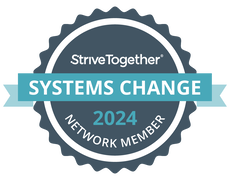“To ensure the best possible future for our community, we need to make sure that everyone has the opportunity to earn a great education.
Building Our Future is a broad-based initiative that seeks to work with our schools and the larger community to eliminate barriers to educational success.” -- Todd Battle, Zilber Property Group
Building Our Future is a broad-based initiative that seeks to work with our schools and the larger community to eliminate barriers to educational success.” -- Todd Battle, Zilber Property Group
What is Building Our Future?
In partnership with StriveTogether, a model in more than 65 communities nationwide, we seek better educational opportunities for students from cradle to career by uniting partners from every sector - community members, education, non-profit, business, faith, government and philanthropy - toward a singular vision and common action. Using data, our networks provide targeted strategies, implement continuous improvement and hold each other accountable. By agreeing on a shared goal, we align partners to move each outcome area, shown below. Currently, we are in what StriveTogether calls the Sustaining Gateway, part of a recognized theory of action to build and sustain a civic infrastructure necessary to improve outcomes.
Building Our Future also partners with The Wisconsin Partnership which is a collaborative effort formed to identify and advocate for state policies that will enable each community to move further, faster toward its early learning goals. This is a real opportunity to move the needle overall, and especially for underserved populations. The Wisconsin Partnership communities collectively serve 25 percent of Wisconsinites age 0 to 8, and 70 percent of low-income Black and Latinx Wisconsinites in that age range.
Building Our Future also partners with The Wisconsin Partnership which is a collaborative effort formed to identify and advocate for state policies that will enable each community to move further, faster toward its early learning goals. This is a real opportunity to move the needle overall, and especially for underserved populations. The Wisconsin Partnership communities collectively serve 25 percent of Wisconsinites age 0 to 8, and 70 percent of low-income Black and Latinx Wisconsinites in that age range.
Our Roadmap
Because cradle to career spectrum is such a wide range, the StriveTogether partnership organizes this into separate outcome areas - what we call our roadmap.
Tenets of Collective Impact & How We Do the Work
Collective Impact focuses not on programs, but on large-scale, system-wide social problems. The idea of collective impact is to bring a large number of people together in connected sectors - not to implement something new; but to change the way they work and the environment they work within. Building Our Future acts as the backbone organization to this work, supporting the function of its five tenets:
Our Principles
Systems Change
What does system change look like?
It takes a change in how we work, an examination of the relationships and processes that connect us, and a change in the models we have around funding and measurement. Once we can admit that failure is an important part of learning, and that systems change takes a long time, we can take a measured approach to strengthening how Kenosha County systems leverage data and community to enhance equitable outcomes for our children.
The reality is that systems change usually takes a long time, it's hard work, and not everything on that journey will turn out the way we want it to. The good news: Kenosha County is ready and willing. We at Building Our Future see this every day in our partners, our families, our children, and our community.
It takes a change in how we work, an examination of the relationships and processes that connect us, and a change in the models we have around funding and measurement. Once we can admit that failure is an important part of learning, and that systems change takes a long time, we can take a measured approach to strengthening how Kenosha County systems leverage data and community to enhance equitable outcomes for our children.
The reality is that systems change usually takes a long time, it's hard work, and not everything on that journey will turn out the way we want it to. The good news: Kenosha County is ready and willing. We at Building Our Future see this every day in our partners, our families, our children, and our community.
Racial Equity
Why focus systems change work on racial equity?
Building Our Future, as both a partnership of Kenosha institutions and as an organization, knows that the only way to increase the overall success of our children is with an intentional focus on the success of students of color and low-income students. Data throughout the cradle-to-career spectrum show large, persistent gaps, from access to resources to achievement in school and employment, to earnings later in life.
What has our Equity work looked like so far?
First and foremost, Building Our Future and its partners do not view equity work as different from our other work - working toward more equitable cradle-to-career outcomes, and better outcomes overall for Kenosha County's children, are the same thing.
Data from our annual partnership survey show that the perception of equitable outcomes varied entirely based on the respondent's background: Respondents of color overwhelmingly say Kenosha County systems as being less equitable than did white respondents, and respondents of color not working at major Kenosha institutions and organizations saw outcomes as even more inequitable. Because of the presence of all this data, we committed to:
Where can you jump in?
We need to see beyond our children's outcomes and examine our system. Everyone in Kenosha County has a role. Examine your role in the system as a participant: as a member of the community, as a person in your career, as a person with your relationships. Who and what can you influence, and can these actions take place in alignment with others?
Building Our Future, as both a partnership of Kenosha institutions and as an organization, knows that the only way to increase the overall success of our children is with an intentional focus on the success of students of color and low-income students. Data throughout the cradle-to-career spectrum show large, persistent gaps, from access to resources to achievement in school and employment, to earnings later in life.
What has our Equity work looked like so far?
First and foremost, Building Our Future and its partners do not view equity work as different from our other work - working toward more equitable cradle-to-career outcomes, and better outcomes overall for Kenosha County's children, are the same thing.
Data from our annual partnership survey show that the perception of equitable outcomes varied entirely based on the respondent's background: Respondents of color overwhelmingly say Kenosha County systems as being less equitable than did white respondents, and respondents of color not working at major Kenosha institutions and organizations saw outcomes as even more inequitable. Because of the presence of all this data, we committed to:
- Making our networks more reflective of the Kenosha community
- Bringing a series of trainings to Kenosha County, such as those from the Racial Equity Institute, to begin the conversation around systemic racism with for-profit, not-for-profit, and governmental leaders, recognizing that education is the first step toward change.
Where can you jump in?
We need to see beyond our children's outcomes and examine our system. Everyone in Kenosha County has a role. Examine your role in the system as a participant: as a member of the community, as a person in your career, as a person with your relationships. Who and what can you influence, and can these actions take place in alignment with others?






